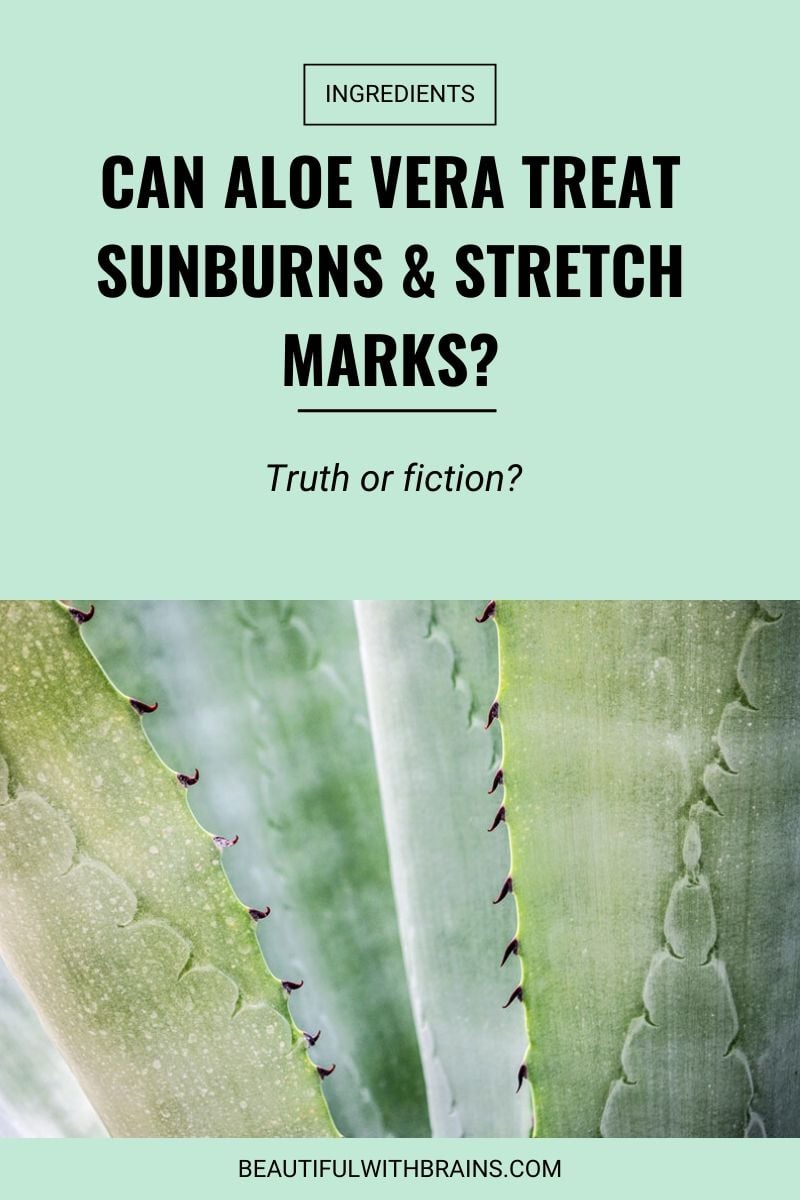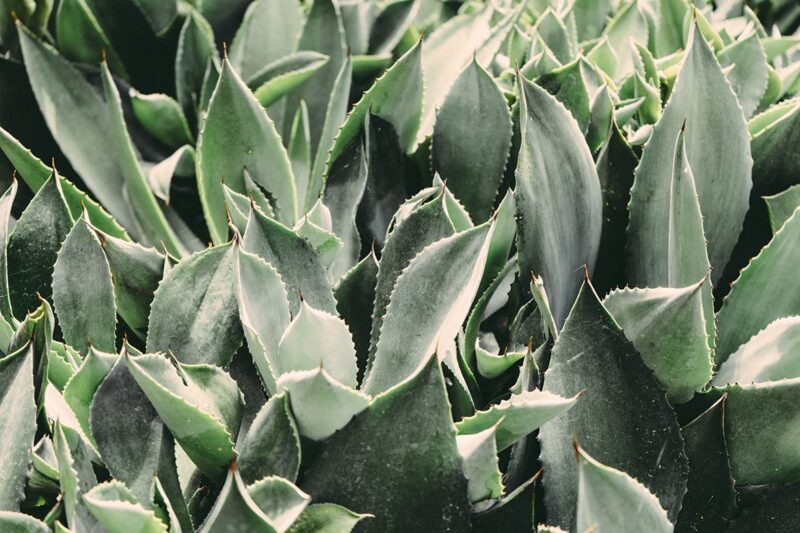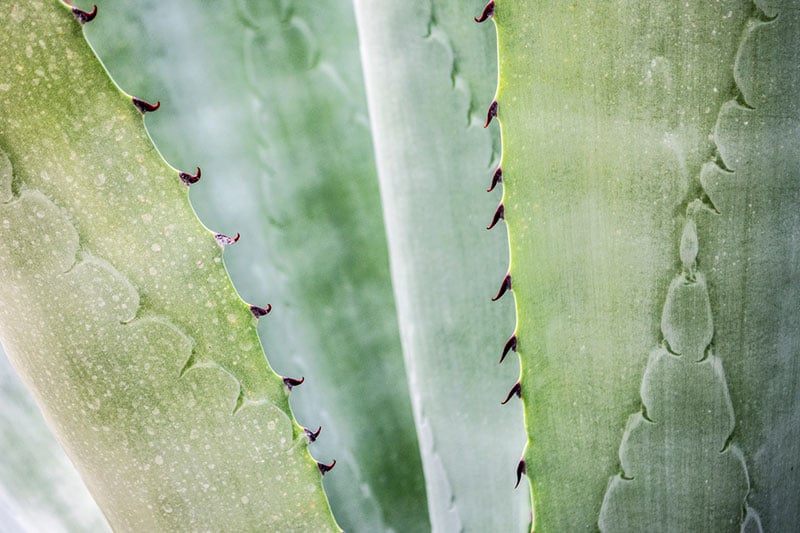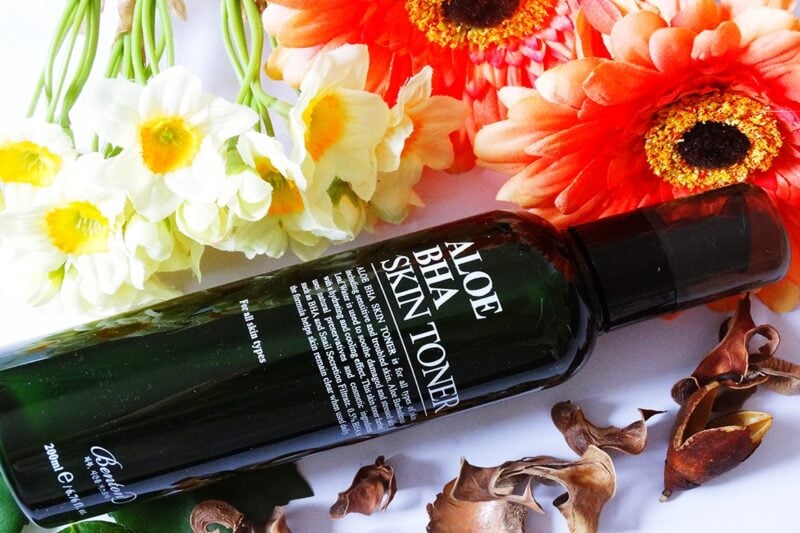
Got a sunburn? Use aloe vera. Can’t stop scratching an itchy rash? Use aloe vera. Skin so dry it hurts? Use aloe vera. This little plant is said to be the cure for pretty much every skin ailment – and it’s been doing that for centuries. Did you know aloe was one of the most frequently prescribed medicines during the19th century?! Aloe vera has staying power. More than a century on, its refreshing, soothing juice is being used to moisturize skin, soothe irritations, heal sunburns, treat psoriasis, and even make stretch marks disappear. Can it really do all that or have we all been carried away by the hype? Let’s find out what science says:
What Is Aloe Vera?
Aloe vera is a cactus plant that belongs to the Liliaceae family. It grows in dry climates, such as India and parts of Africa. The leaves of the aloe plant are made up of three different layers: the outer rind, the middle latex layers, and the inner mucilage (you probably know it as gel). The gel itself is made up of 99.5% water and 0.5% of vitamins, amino acids, polysaccharides, and phytosterols.
“Additionally, it has vitamins A, C, D, and E, and it also has minerals, like zinc, potassium, and magnesium, so it really is this rich gel or extract that can be used for a variety of things,” says board-certified dermatologist Marnie Nussbaum, MD. Even though they make up such a tiny percentage, it’s that small 0.5% of goodies that make aloe vera such an effective skincare powerhouse.
Aloe Vera Benefits For Skin
If you listen to the hype, Aloe Vera can do anything, from moisturising skin to soothing sunburns and even treating acne. Sounds too good to be true? It kinda is. There are a ton of uses for aloe vera in skincare (and beyond), but the only proven ones are moisturising and soothing skin. Nussbaum adds: “There are tons of uses for it, and it’s great for face masks and calming, but it’s not better than other things we have, like vitamin C and niacinamide. It’s a safe thing to use for the skin for hydration and anti-inflammatory, but it’s not an end-all, be-all.”

Is Aloe Vera A Good Moisturizer?
Yes. Aloe Vera is mostly made up of water, so it definitely hydrates skin. It works thanks to a humectant mechanism. Let me explain it in plain English. Humectants are moisture magnets. Like a magnet, they attract moisture from the environment and bind it into your skin. Once there, the extra moisture plumps up your skin, so your fine lines and wrinkles look smaller. It also makes skin softer and gives your complexion a dewy glow. Aloe Vera is a good moisturizer for all skin types, including oily. It hydrates skin without adding any extra oil to it. No greasy feeling or extra shine. Dry skin? It still works, but you need a moisturizer on top to seal the extra moisture in, or it’ll just dissipate into thin air again.
Related: What The Heck Are Humectants And Why Are They In Your Skincare Products?
Can Aloe Vera Soothe Sunburns & Irritations?
Again, yes. Aloe vera has anti-inflammatory properties that can soothe irritated skin, sunburns, eczema and psoriasis. It’s not a miracle cure. One application isn’t enough to make redness disappear, heal a sunburn, or treat psoriasis. But it helps relieve the symptoms for a while. Nussbaum says, “The phytosterols soothe itchiness and irritation and prevent transepidermal water loss, which is really important when you have a sunburn or a windburn.”
Granted, consistency is key. You need to use Aloe Vera regularly until the irritation/sunburn has fully healed. But if you want to treat them naturally instead than using corticosteroids, Aloe Vera will do the job. Just be patient.
FYI, Aloe Vera isn’t a treatment for psoriasis or eczema. But it makes a good moisturizer for you, especially when you’re experiencing a flare-up. “It wouldn’t be my go-to for eczema or psoriasis, although it has been shown to help it,” Nussbaum adds. “It can give a moisturizing effect, just not a healing effect.”
Related: 3 Ways To Treat A Sunburn Naturally
Can Aloe Vera Treat Acne?
It’s true that Aloe Vera is a source of salicylic acid, a powerful acne fighter with anti-bacterial properties. That means it can treat acne, right? No so fast. A 2018 shows that Aloe Vera can treat moderate acne… when used together with propolis and tea tree oil, two known acne fighters. This combo treated acne better than erythromycin and was gentler on the skin. It’s likely that propolis and tea tree oil killed the acne bacteria and Aloe Vera soothed skin.
But how well does Aloe Vera treat acne on its own? I couldn’t find any studies on topical application of Aloe Vera for the treatment of acne. But I’ve come across one that tested oral Aloe Vera juice for acne. The results? It reduced acne lesions… but not any better than the placebo!
In other words, aloe vera can’t treat acne. There simply isn’t enough salicylic acid in the gel to do the job. But it helps to soothe the inflammation from acne itself and the harsh anti-acne treatments you may be using (think tea tree oil and benzoyl peroxide).
Related: Is Tea Tree Oil An Effective Treatment For Acne?

Can Aloe Vera Reduce Stretch Marks?
Stretch marks happen when skin expands to accommodate growth. When you stretch it too much, you disrupt collagen production. Next thing you know, stretch marks appear on your skin. Ugh. They’re totally normal. You don’t have to be ashamed of them. Even celebrities have them. They’re just better at hiding them (Photoshop helps a lot 😉 ).
But can you get rid of them with a bit of Aloe Vera gel? Sorry to be the bearer of bad news, but nope, Aloe Vera can’t reduce stretch marks. No topical treatment can. So why do so many people swear Aloe Vera improved the look of their stretch marks? Look is the key word here. Aloe Vera is moisturizing remember? Anything that moisturises skin makes it appear smoother. But once the moisturizing effect is over, your stretch marks are still there. Bummer!
Aloe Vera Side Effects
Aloe Vera is super gentle on the skin. Allergies and irritations are possible (heck, there are people allergic to water!) but very, very rare. If you have sensitive skin, do a patch test before, just to be on the safe side.
How To Use Aloe Vera In Your Skincare Routine
Aloe vera is so gentle, it goes with everything. You don’t have to worry about mixing it with retinoids, niacinamide, or whatever. Phew! But if you use it to hydrate your skin, do you apply Aloe Vera or moisturizer first? Aloe Vera. It attracts moisture into your skin, remember? Then, you can follow up with moisturizer to seal it all in.
PRO TIP: Store aloe vera in the fridge. It provides a cooling sensation that further reduces irritations.
Related: What Skincare Ingredients Should You Never Use Together?
Who Should Use It?
Anyone can use aloe vera, but it’s more suitable for sensitive skin and anyone who wants to reduce sunburn or itching.
How Often You Can Use it?
Aloe vera is so gentle and moisturising, you can use it two to three times a day safely.
Should You Use A Skincare Product With Aloe Vera Or The Juice Directly From The Plant?
“If there is any benefit to using aloe topically, you are much more likely to get those benefits from using a treatment directly from a plant versus using a formulated product,” says Perry Romanowski, one of the brains behind The Beauty Brains. “The amount of aloe in formulated products varies widely, but the vast majority of products have only a tiny bit of aloe in them.”
I personally am too lazy to do this, but if you want to use aloe vera straight from the plant, here’s how to do it. Use one of the exterior leaves (they’re the most mature and provide a richer gel). Cut the leaf at the base. Shave off the spine. Slice away the top and bottom layers of skin. Then, scrape off the gel at the centre and use much as you need.

Aloe Vera Gel VS Cream: Which One Is Better For Your Skin?
Aloe Vera is Aloe Vera, ladies. As long as Aloe Vera is top of the ingredient list (i.e., there’s enough of it to do the job), it doesn’t matter if you’re using a gel or a cream. In the end, it all comes down to personal preference. Oily skin loves the lightweight texture of a gel, while dry skin prefers the richness of a cream.
PRO TIP: For best results, use Aloe Vera juice cold-pressed from the whole-leaves. It’s the most effective.
Related: How To Read A Skincare Ingredient List (Even If You Hate Science)
What Are The Best Skincare Products With Aloe Vera?
- Benton Aloe Real Cool Soothing Gel ($8.00): This refreshing gel contains 93% aloe vera to deeply moisturise and soothe sensitive skin. It’s a good alternative to pure plant juice, if you don’t have aloe vera at home. Available at Soko Glam and Yes Style.
- Holika Holika Aloe 99% Soothing Gel (£7.85): This gel contains a whopping 99% aloe vera gel + a bunch of soothing agents, like cucumber and centella asiatica. Super soothing! Plus, the bottle is shaped like an aloe vera leaf. How cute is that? Available at Beauty Bay, iHerb, Look Fantastic, and Yes Style
The Bottom Line
Aloe Vera is a moisturising and soothing powerhouse, but it’s not the miracle worker it’s cracked up to be. It hydrates your skin, calms down irritations, and soothes sunburns. But there’s no proof it does anything else.


Most companies that produces beauty cosmetic products are using aloe vera as main ingredients which this is highly demand of most people. But because of other chemical substances that formulated on it, people are prefer to used by natural process of treatment.
Stephanie, aloe vera is a wonderful ingredient indeed. It’s a shame though that some people snub products with it because they contain synthetic ingredients as well, especially because, unlike popular opinion, they aren’t dangerous but work well.